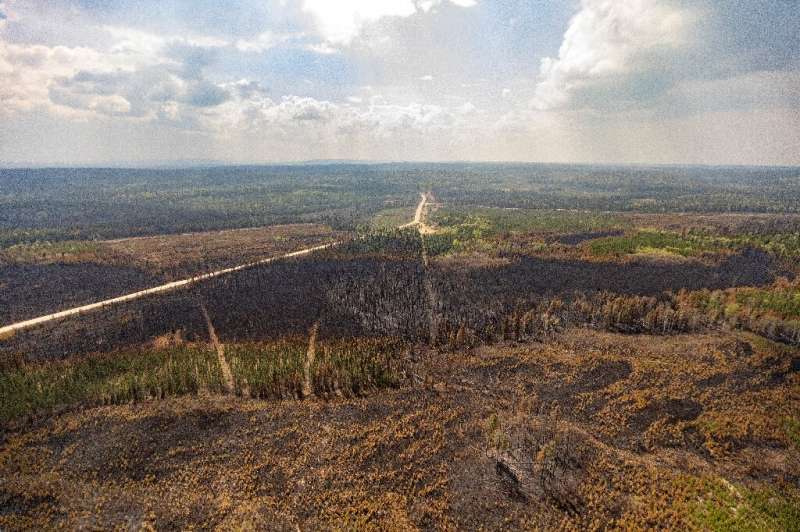This article has been reviewed according to Science X's editorial process and policies. Editors have highlighted the following attributes while ensuring the content's credibility:
fact-checked
reputable news agency
proofread
Wildfires abate slowly in western Canada

A lull in high temperatures brought some relief on Wednesday from wildfires in Alberta in western Canada as reinforcements arrived to help battle the blazes.
In total, 76 forest and brush fires remained active in the province compared to 110 a few days ago, authorities said. Twenty-three are still considered uncontrolled.
Several Canadian provinces—as well as the US states of Oregon and Alaska—sent reinforcements to fight the wildfires, which authorities said could flare again as high temperatures return over the weekend.
"We're very happy to have new resources coming in from our colleagues across Canada and colleagues in the United States. And I think that's going to be a much needed boost for firefighters who have been at this, some of them around the clock, for quite a while," Christie Tucker, a spokeswoman for the relief effort, said at a news conference.
The number of evacuees from fire-hit areas dipped to 24,000, down from almost 30,000 last weekend, authorities said.
At least one oil company, Tourmaline, has reopened seven of its nine facilities in Alberta, one of the world's largest oil producing regions. The other two facilities were expected to start up "in the next couple of days," it said in a statement.
Alberta has experienced a hot, dry spring that has been conducive to fire outbreaks. The vast majority of the fires are human-caused.
Mayor Allan Gamble of Parkland County voiced relief that "all of our evacuated residents" returned home and two highways leading to the county have reopened.
In the northern part of the province, some Indigenous villages were deeply affected, such as the Cree community of Little Red River.
"There's been a huge loss of infrastructure, no lives thank God, but 4,000 people are evacuated, over 150 homes... have been destroyed or demolished," said Patty Hajdu, federal minister of Indigenous Services.
In Yellowhead County, including Evansburg (west of Edmonton), residents were allowed to return home on Wednesday morning.
"The wildfire risk has been reduced thanks to firefighting efforts and the shift in weather," the county said in a statement.
However, it warned that "wildfires may still be active in the area."
In Fox Creek, cooler temperatures and reduced wind allowed firefighters to fortify containment lines to prevent fires from spreading.
"Don't let the skyline and current clear skies deceive you. This fire is out of control and burns deep into the ground. It is a sleeping giant. The situation can change quickly," the county said in an advisory.
© 2023 AFP





















